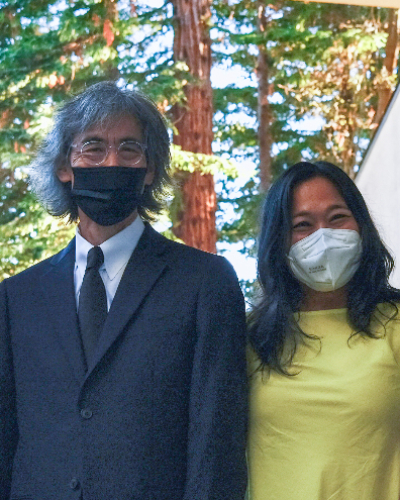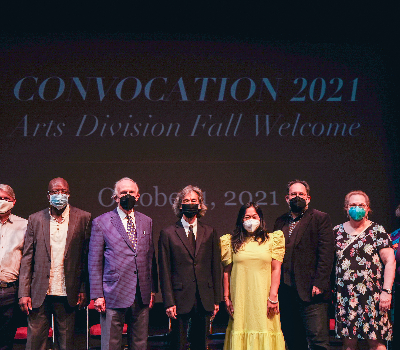Campus News
Arts convocation spotlights excellence and inclusion
Renowned conductor Kent Nagano was honored with the inaugural Distinguished Banana Slug Arts Award by the new Arts Dean Celine Shimizu. Shimizu spoke to the power of music and the arts in a time of ‘solemn joy’ during the Arts Convocation.


Renowned conductor Kent Nagano (Porter ’74, music, sociology) made an impassioned defense of the arts last week after receiving the first-ever Distinguished Banana Slug Arts Award, recognizing his outstanding career as a conductor, musician, and mentor.
Nagano, appearing on campus at the first UCSC Arts Convocation, an event established by new Arts Dean Celine Parreñas Shimizu, described live music as a powerful force, breaking down barriers and making our differences seem irrelevant. Quoting Les Misérables author Victor Hugo, Nagano said that “Music expresses that which cannot be said, and on which it is impossible to remain silent.”
The convocation was held at the Mainstage Theater, with mask requirements and a limited crowd. Overflow seating was available at the nearby Second Stage Theater via Zoom.
The ceremony was a high-profile collaboration between the staff of the Department of Performance, Play and Design and the Arts Division staff.
Nagano is the director of the Hamburg State Opera. Nagano’s early professional years were spent in Boston, working with Seiji Ozawa at the Boston Symphony Orchestra. In 1984, Olivier Messiaen selected Nagano to assist in premiering his opera, Saint François d’Assise.
A distinguished and in-demand guest conductor, he has worked with most of the world’s finest orchestras, including the Vienna, Berlin, and New York Philharmonic Orchestras. He has recorded widely, receiving multiple Grammy Awards as well as multiple prizes from Grammophone, Grand Prix du Disque, Edison, ECHO, and Musical America (Conductor of the Year).
Nagano received the Distinguished Banana Slug Award in the form of a special bronze statue of a banana slug on a rock that was made at the UCSC Foundry by staff member J. Gaston. Dean Shimizu said the goal of the prize was “to honor the achievements of our distinguished alumnus, and to welcome him home with a promise to build upon Maestro Nagano’s legacy.”
Why do we need the arts?
“Let me begin by asking a question: Why do we need the arts?” Nagano asked the convocation audience. “Why do human beings need aesthetics? These questions have been asked throughout the history of mankind and are the ones I was asked by many people, especially my parents, when I announced I wanted to study music at UCSC. You will confront this question again and again, and your answers will guide the pathways of your career.”
For the answer, Nagano turned not only to the wise words of Victor Hugo but to the philosophies of the Canadian author Northrop Frye, who once remarked that the natural sciences can help us to explain the world that surrounds us, but “the arts begin at the edge of the world we can imagine, the one that we construct in our minds, not the one that we see around us.”
“This is why the arts are so essential, especially now during a turning point for society, in which arts are under constant threat, their importance questioned, their importance to social development underestimated,” Nagano continued.
“This is the viewpoint reflected by many governments around the world,” Nagano said. “In its place in the 21st century is an entire canon of values that have been established internationally, a canon that places the economic above the social experience, above inner fulfillment. These have become the priorities.
“Art cannot be quantified [in economic terms],” Nagano continued. “It is part of a value system which fundamentally reflects the humanism of the age of enlightenment, which is to say individual freedom, community equality, and inclusion.”
A strong message of inclusion
Those who spoke at last week’s convocation kept returning to the theme of inclusion. Campus Provost and Executive Vice Chancellor Lori Kletzer called attention to UCSC Arts Division’s world-class faculty of scholars and practicing artists and its ethos of innovation.
But Kletzer, in her remarks, placed a special emphasis on a guiding principle.
“We are also distinguished by our belief that all students regardless of degree level and prior background should be afforded an opportunity to engage in the kind of interdisciplinary work that happens in this division,” Kletzer said.
Addressing the convocation, Celine Parreñas Shimizu, who started work as the new Arts Division dean in July, sustained that theme of equity and inclusion in her Dean’s Vision Statement for the Arts, which invited the community to join together in shared purpose.
At the beginning of her remarks, Shimizu called attention to the joyous nature of the gathering, while paying her respects to the victims of COVID-19.
“In this new academic year, we are emerging from the pandemic, suffering from living in isolation among mass death,” she said. “I myself lost an entire generation in my family. The way I define mourning is the deep sorrow that comes from feeling excessively alive in the aftermath of loss.
“In this time of grief and ongoing anxiety, the joy of being in proximity and in community is indeed so happy, yet full of solemnity. We are here today exploring what it means to begin again in the university where we share this great, grand enterprise of learning, growing, and finding our paths. I aim for us to have the audacity to create, imagine, and act.”
Shimizu, an award-winning filmmaker and scholar, shared her vision to communicate how diversity, equity, and inclusion foster excellence in the arts, with programmatic innovations including mentorships, funding for scholarships and faculty research, and strong advocacy for students.
“There is no excellence without equity,” Shimizu said, “and no innovation without inclusion. No one should face obstacles to learning or impediments to their education, especially for art students pursuing degrees that not all parents are excited about.
“The industry is so competitive to enter,” Shimizu continued. “The pandemic teaches us how essential the arts are to our survival, yet we do not all have equal access to it.”
She reflected on the painful experiences captured in recent protests and movements, with hashtags including Time’s Up, Me To, and Oscars So White, which the New York Times described as “the hashtag that changed the Oscars” by calling attention to the “entrenched disparities” of representation in the entertainment industry.
Though those statistics are disturbing, “the university is the place where this changes, so the people making art and contextualizing and interpreting narratives that organize our world represent a wider perspective. Look around: We are the voices of the century, the real change is us,” Shimizu said.
Shimizu outlined a far-ranging vision plan that supports undergraduate and graduate student recruitment, retention, and success, while bolstering institutional partnerships with companies such as Pixar, Amazon, Lionsgate and Visual Communications Media.
“UCSC is widely known as an effective engine for social and economic mobility for our students and their families,” Shimizu said. “We help make this possible by demystifying how the arts can lead to careers.”
Part of the vision plan includes strong support for faculty innovation, research, and mentorships; and reaching out to staff members to ensure they have the institutional support that they need.
“My philosophy in working with staff and student workers is to make sure they know they are essential to and appreciated in the running of the institution, that work does not take over so that we sacrifice our enjoyment of the arts in our lives,” Shimizu said. “I am currently working with my senior staff on identifying how to make efficient processes informed by the necessity of empathy in these times in taking our collective grief and turning it into collective possibility.”
Chancellor Cynthia Larive reflected on Shimizu’s comment about excellence and inclusion.
“We are working hard to create an inclusive campus,” Larive said. “We are committed to promoting and protecting an environment that values and supports every person, an atmosphere of respect, honesty, cooperation, and fairness. It is at the heart of who we are.
“At UC Santa Cruz, the arts are incredibly important to our campus as they are to the human experience,” Larive continued. “The arts give meaning to our lives and help us understand our world.”